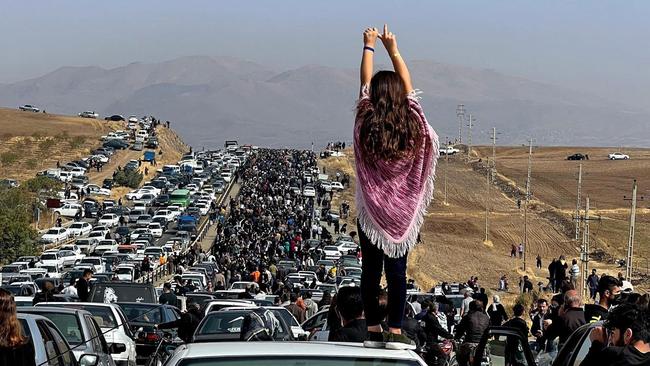Floggings, fines and confiscated cars: regime ups its ‘morality war’
Details of the punishments, including floggings and fines, handed out by the country’s morality police have been revealed in a report by Amnesty International.

Iran’s morality police have continued their extensive crackdown on women who remove their headscarves, including detaining and flogging them, or confiscating their cars as punishment, a new report states.
Women interviewed by Amnesty International offered a “frightening glimpse” into the enforcement of strict Islamic dress codes, more than a year after protests shook the country following the death of Mahsa Amini, a young woman who had been detained for removing her hijab.
Amnesty suggested that in the past year “tens of thousands of women have had their cars arbitrarily confiscated as punishment for defying Iran’s veiling laws, while others have been prosecuted and sentenced to flogging or prison terms, or have faced other penalties such as fines or being forced to attend ‘morality’ classes”.
In one instance, a woman was sentenced to 74 lashes for appearing in public without a hijab, the group said. Roya Heshmati later recounted she was flogged in a room with a judge present, describing it as a “medieval torture chamber”.
Amnesty also spoke to 11 women who described car chases or being stopped by police, or having their cars impounded while they were driving to work, medical visits or school runs. Some women said they had been left stranded on busy roads or in cities far from their home town. Vehicles would be released after 15-30 days, they said, once payment fees for parking and crane transfers are settled and written undertakings to observe compulsory veiling are obtained from women or their male relatives.
Regime agents patrol the streets and public places such as shopping malls to spot women who are not wearing their hijabs. Members of the public also inform on their fellow citizens.
Women who are suspected of not dressing modestly are then sent text messages summoning them to police stations. In some instances, men with long hair who were mistaken for women have also been hauled before the morality police, according to one witness.
Another witness said she had been summoned to a police station after a stranger reported her for violating the dress code. “There were many other people there just like me … even several men there who had long hair and had been mistaken for women by those who had reported their licence plates,” she said.
Another, a young girl, was taken to court for posting hijab-less pictures of herself on Instagram, according to her mother.
A 17-year-old girl told Amnesty she had been temporarily suspended from school after a CCTV camera captured her unveiled in a classroom, while the head teacher threatened to report her to the Revolutionary Guards if she removed her headscarf again.
Women have been required to cover their heads in public since the 1979 Islamic revolution. But in the outrage following Amini’s death in September 2022, protesters chanting “Woman, Life, Freedom” mounted the most sustained challenge to Iran’s clerical regime in years.
“Prior to the ‘Woman, Life, Freedom’ revolution, we felt that the hijab was simply a part of our clothing that we had to wear, but afterwards we realised that we can actually remove our headscarves, that the compulsion to wear it should not even exist,” said Najieh, who explained she had been taken to court. “The Islamic Republic has become so desperate that it is terrified of the absence of a piece of cloth like a headscarf and this is a manifestation of their utter cowardice.”
After several months of protests, the Iranian parliament sought to reassert control in September last year by passing a “Bill to Support the Culture of Chastity and Hijab” that would increase the penalties for violating the law. Although the draft law has yet to be formally ratified, it states that women or girls found not following the strict implementation of the dress code could face up to 10 years in jail, where the previous term was two months. Fines would be raised from the equivalent of about $18 to about $13,000.
Amnesty’s report detailed the cases of at least 15 women and a 16-year-old girl in seven provinces who were prosecuted solely for appearing without headscarves or for wearing “inappropriate” head coverings in public, or from photographs posted on their social media accounts.
Although national statistics are not published, a statement in January from the police chief of Qom province, south of Tehran, referred to 1986 criminal cases in connection with compulsory veiling in the region since March 2023, suggesting many thousands of women could be penalised each year.
There are signs of simmering resentment, however: parliamentary elections last week saw a record low turnout after a majority of moderate candidates were barred from standing.
THE TIMES





To join the conversation, please log in. Don't have an account? Register
Join the conversation, you are commenting as Logout